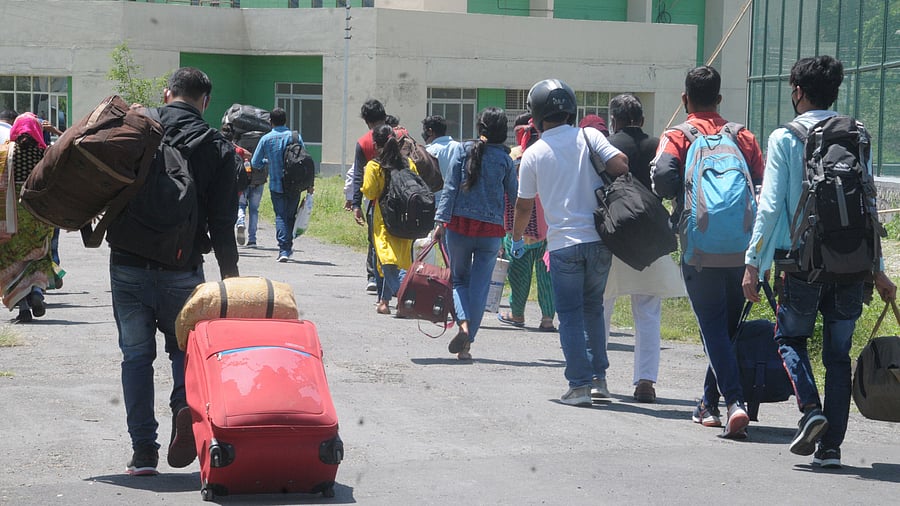
Representative image for migrant workers
Credit: PTI Photo
Karnataka’s growth story is incomplete without acknowledging its migrant workers. From Bengaluru’s glittering skyline to its garment factories, domestic services, and the booming app-based gig economy, migrants form the invisible backbone of the state’s urban economy. Yet, while their labour powers Karnataka’s dynamism, their lives remain precarious, their rights uncertain, and their voices unheard.
Recent estimates reported in DH (Aug 24) suggest that nearly 85% of Karnataka’s migrant workers come from six states—Bihar, Assam, Odisha, Jharkhand, West Bengal, and Uttar Pradesh. This concentration underlines the state’s dependence on interstate mobility. The paradox is that even as Karnataka draws this large workforce, its labour department does not maintain accurate, real-time data. Instead, it relies heavily on employer filings, which exclude informal, self-employed, and contract-based workers. The absence of credible statistics creates a policy vacuum where the most vulnerable fall through the cracks of welfare and social protection.
The Covid-19 pandemic revealed this fault line with brutal clarity. If a crisis of such magnitude left the backbone
of Karnataka’s workforce so exposed, it was because invisibility had already been normalised.
A growing body of research documents the lived realities of migrants in Karnataka. The findings are sobering:
Precarious work: The Indian Institute of Human Settlements (IIHS) highlights how construction and gig workers live with irregular incomes, unsafe conditions, and little bargaining power.
Health vulnerabilities: NIMHANS
and St John’s Medical College studies point to high rates of occupational injuries, respiratory problems, and substance
abuse among young male migrants in construction.
Job losses and exclusion: The State of Working India report by Azim Premji University found that informal migrants in Bengaluru were disproportionately affected by job losses, with many unable to recover livelihoods.
Educational disadvantage: Research by the Institute for Social and Economic Change (ISEC) shows migrant children struggling to access hostels, scholarships, and continuity in schooling, often dropping out due to mobility and language barriers.
Welfare gaps: A Centre for Budget and Policy Studies (CBPS) study revealed persistent problems of wage theft, food insecurity, and exclusion from welfare schemes.
Governance lapses: The Comptroller and Auditor General of India (CAG) flagged irregularities in Karnataka’s Building and Other Construction Workers’ (BOCW) Welfare Board, including bogus registrations and unspent funds.
Together, these studies paint a consistent picture: migrants sustain the city, but the city does not sustain them.
Six systemic deficits stand out in Karnataka’s approach to migrant labour:
1. Data deficit — No reliable estimates of migrant numbers, their skills, or welfare coverage.
2. Insecure livelihoods — informality, wage theft, and weak enforcement of labour laws.
3. Housing and services gap — Dependence on slums and makeshift camps, with women and children at particular risk.
4. Patchy welfare portability — While One Nation One Ration Card and e-Shram exist, access on the ground remains inconsistent.
5. Weak grievance redressal — Language barriers, lack of awareness, and inaccessible complaint channels.
6. Climate vulnerability — Outdoor workers face rising heat stress, poor ventilation, and inadequate protection.
These challenges are interlinked, trapping migrants in cycles of insecurity.
To balance economic dynamism with social justice, Karnataka needs a comprehensive migrant policy anchored in evidence and accountability. Key priorities include:
A. Data and governance
Establish a migration dashboard integrating employer filings, e-Shram registrations, EPFO/ESIC data, and ward-level surveys.
Digitise and verify BOCW records to eliminate bogus beneficiaries and ensure transparency.
Sign MoUs with sending states for coordinated registration and grievance redressal.
B. Social Security and Entitlements
Strengthen the One Nation One Ration Card system in Bengaluru and industrial belts.
Link e-Shram IDs with state health, accident, and education schemes, supported by on-site registration camps.
Implement the Karnataka Gig Workers’ Welfare Act (2025) in spirit, not just in letter, by constituting a
Welfare Board and ensuring aggregator contributions.
C. Housing and Services
Expand dormitory-style hostels and rental housing near industrial zones through public–private partnerships.
Provide women’s hostels and family housing units with childcare facilities.
Guarantee basic civic services — water, sanitation, electricity, and digital access — in migrant settlements.
D. Health, Safety, and Climate Resilience
Deploy mobile health units and occupational safety audits at worksites.
Run multilingual awareness campaigns and establish emergency helplines.
Include migrants in city heat action plans and mandate shaded rest areas, hydration points, and cool-roof retrofits in settlements.
E. Education and Skill Development
Ensure continuity of schooling through TCs, bridge courses, and bus passes.
Expand scholarships, hostels, and vocational training tailored to migrant youth.
F. Civil Society Partnerships
Fund help desks and worker facilitation centres at bus stations, labour nakas, and industrial hubs, in collaboration with civil society organisations and universities/institutions such as APU, IIHS, ISEC, and CBPS.
Migrant workers are not merely transient labourers; they are builders of Karnataka’s economy and participants in its growth story. Recognising their dignity and securing their livelihoods is not charity — it is sound economic policy. A workforce that feels secure is more productive, more resilient, and more invested in the state’s future.
If Karnataka wishes to sustain its reputation as a dynamic and forward-looking state, it must ensure that those who build its cities can also build their lives with dignity. The question is no longer whether the state depends on migrants. The real question is whether migrants can depend on the state.
(The writer is a visiting professor at Mahatma Gandhi Rural Development and Panchayat Raj University, Gadag, Karnataka; St Claret College (Autonomous), Ziro, Arunachal Pradesh; and an adjunct professor at Kristu Jayanti University, Bengaluru)